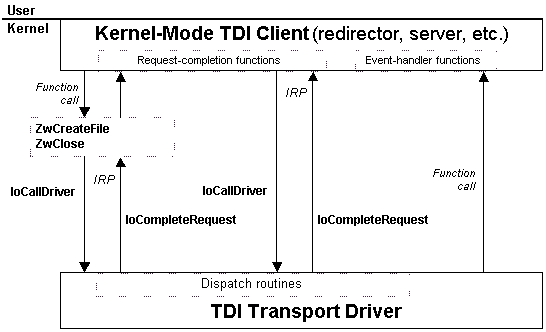3.4 TDI Kernel-Mode Client Interactions
The following figure shows how TDI clients make I/O requests to their
underlying TDI transports and how transports make callbacks to their clients.

Figure 3.2 TDI Client/Transport Interactions
A TDI client interacts with its underlying transport driver as follows:
-
Creating TDI File Objects - A client calls ZwCreateFile to
create or open a file object that represents a transport address, a connection
endpoint, or a control channel. This call causes the Windows NT I/O Manager to
allocate an IRP, to marshal the client-supplied parameters into the IRP, and
to pass the IRP to the underlying transport driver’s TdiDispatchCreate
routine. When the transport driver has set up all the state it maintains for
the newly created file object, it calls IoCompleteRequest (or TdiCompleteRequest)
with the IRP and STATUS_SUCCESS. ZwCreateFile then returns to the TDI
client with a handle to the file object.
Each client process's call to ZwCreateFile creates a separate file
object, even if two clients have specified the same transport address in their
calls to ZwCreateFile.
A successful call to ZwCreateFile opens a transport address, a
connection endpoint, or a control channel, depending on the EaXxx
parameters the client passes in its call.
-
Submitting Requests - After the appropriate file object(s) have been
created, the client can submit requests that reference those objects. For
example, after it opens a file object that represents a particular transport
address, the client can submit an address-information query or “send datagram
from this address” request.
Such a client uses standard I/O system mechanisms and conventions to submit
all such requests:
-
Handling Event Notifications - If a client has preregistered its entry
point(s) for one or more event handlers, the transport driver calls each such
routine when the corresponding network event occurs. For example, if the
client has registered a ClientEventReceive handler on an address associated
with an endpoint-to-endpoint connection, the transport calls this handler when
data sent by the remote-node peer process is received on the local node.
-
Deleting TDI Objects - The client calls ZwClose to delete a file
object when the address, connection endpoint, or control channel is no longer
needed by the client. The close request is forwarded to the transport's
TdiDispatchCleanup and, subsequently, TdiDispatchClose routines.
For more information about the kernel-mode support routines mentioned here,
see the Kernel-Mode Driver Reference. For detailed information about
the TdiXxx and ClientEventXxx routines mentioned here,
see the Network Driver Reference.

